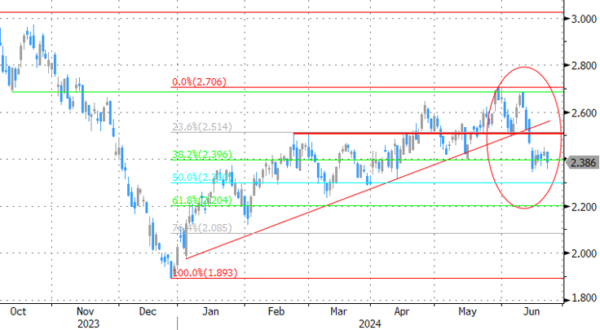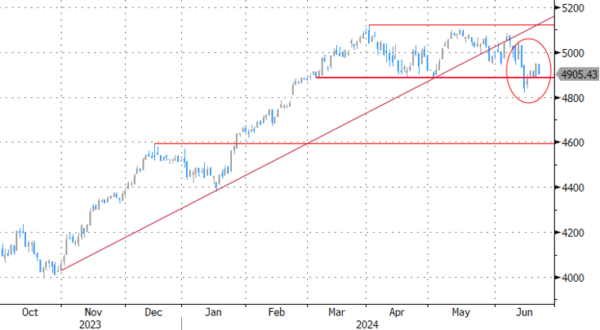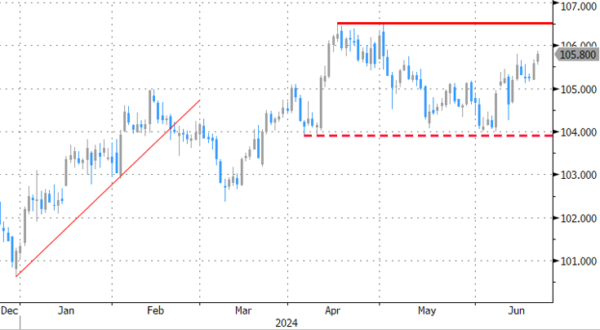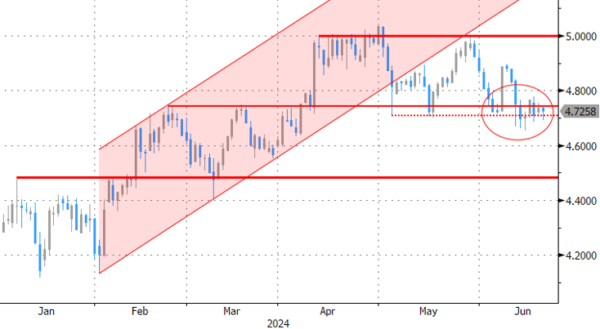Markets
PMI business confidence was on tap at the close of the week. The European June edition comes with an important disclaimer though. PMI owner S&P Global noted that the turmoil in the wake of the European elections and the French snap elections has likely stirred up a lot of uncertainty and that France’s poor outcome (unexpected decline to 48.2 on a composite level) “has significantly contributed to the deteriorating economic conditions in the Eurozone.” Indeed, economic activity unexpectedly eased on an aggregate level from 52.2 to 50.2. S&P Global estimates Q2 GDP growth at 0.2% q/q. Both services (52.6 from 53.2) and manufacturing (45.6 from 47.3) printed declines. A renewed fall in new orders was responsible, decreasing (slightly) for the first time in four months on sharply dropping manufacturing export orders. Aggregate net employment rose at the slowest pace since March as staffing levels were raised solidly in the services, while a similarly-sized fall was recorded in manufacturing. The combination of decreasing new orders but marginally rising employment resulted in a reduction of backlogs. Input prices, while easing for a second month, still rose at a pace slightly faster than the pre-pandemic average. The decline was driven by services (38-month low) but with manufacturing posting a renewed increase in their cost burdens for the first time in 16 months. Output price inflation equally eased again with an interesting divide as services inflation was the lowest in three years but manufacturers lowered prices at the slowest pace in 14 months. Confidence for the future waned, but more than anything of the above, should be taken with a pinch of salt given the timing of the survey (amidst European political turmoil). German rates nevertheless drop several bps with the front-end of the curve outperforming (-6.2 bps). The 10-yr eases 5.5 bps with support at 2.34% never really having been in danger. European stocks grind lower. The likes of the EuroStoxx50 loses >1%, capping this week’s recovery from the sell-off the week before to just a little over 1%. The euro neared the post-election low of 1.0668 before paring gains to 1.0692. Rates in the US ease between 3.7-4.6 bps ahead the US PMIs. Wall Street opened slightly lower.
Contrasting with Japan, UK and the Euro area, US PMIs came in to the stronger side of expectations, catching markets probably a bit off guard. The composite reading unexpectedly grinded higher from 54.5 to 54.6 with both services (55.1) and manufacturing (51.7) suggesting a nice economic expansion overall. US yields cut back losses to less than 2 bps in a first reaction.
News & Views
UK PMIs showed business activity in the country in June expanding at its slowed pace since November. The composite output index declined to 51.7 from 53.0 in May. Contrary to the EMU, a slowing pace in the services sector growth (activity index 51.2 from 52.9) offset a stronger performance in manufacturing (51.4 from 51.2). Output growth at goods producers even reached the strongest growth in 26 months (54.2), driven by improved order book intakes and strong business confidence. On the easing in services activity, S&P said that survey evidence indicated the slowdown was partly driven by a pause in spending decisions during the election period. Despite a mixed picture for activity, S&P UK firms are facing a quickening of input cost inflation as severe global shipping constraints led to higher transport costs. This resulted in quicker increases in output charges among both manufacturing and services companies, with producers notably raising their prices at the sharpest rate since May 2023. The combination of slower growth but at the same time signs of a new uptick in inflation only complicate the decision making of BoE members who are considering move toward an early rate cut.
Average gross earnings in the country in April were 13.5% higher than in the same period last year, data from the Hungarian Statistical Office showed today. Real earnings were 9.5% higher than in the same month last year. High real wage growth fueling domestic demand is an important factor in the decision making process of the Hungarian Central Bank (MNB) as it expects both headline and core inflation to return higher in the second half of the year. In this respect, the MNB this week slowed the pace of rate cuts to 25 bps (base rate 7.0%) and will shift to a guarded month-on-month approach going forward. The forint at EUR/HUF 397 is holding within reach of the weakest YTD levels.
Graphs
Germany’s 10-yr yield: support at 2.34% never really in danger despite weaker-than-expected PMIs
EuroStoxx50: this week’s recovery after the sell-off in the one before is all but disappointing
DXY: trade-weighted dollar looks set for a return towards the YtD high at 106.517
US 2-yr yield stabilizes around recent lows with strong PMIs capping daily losses




